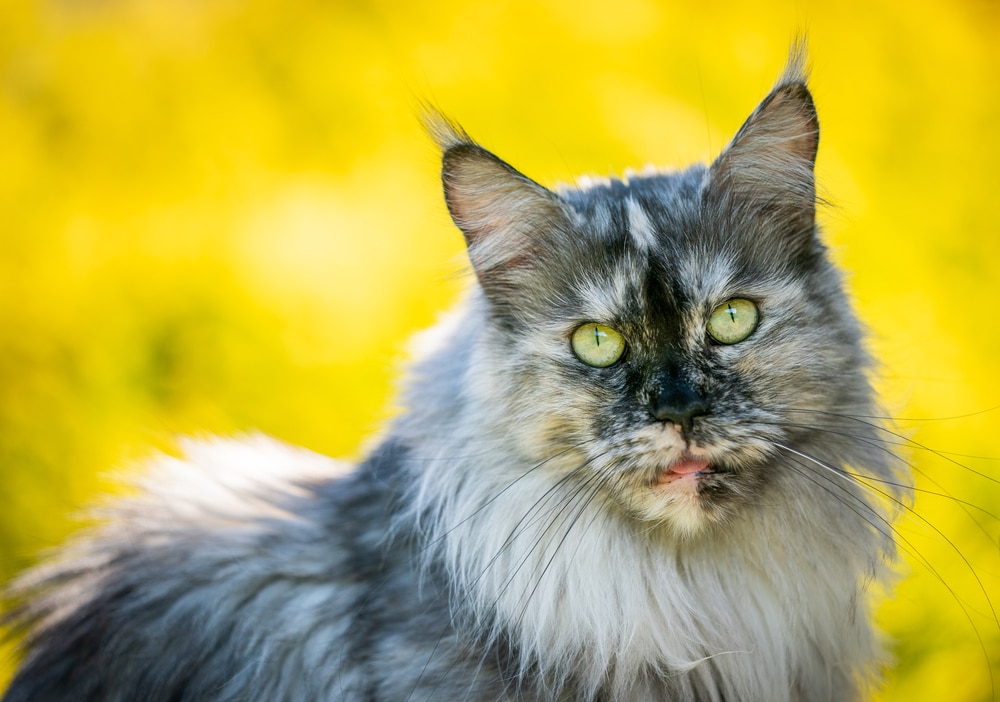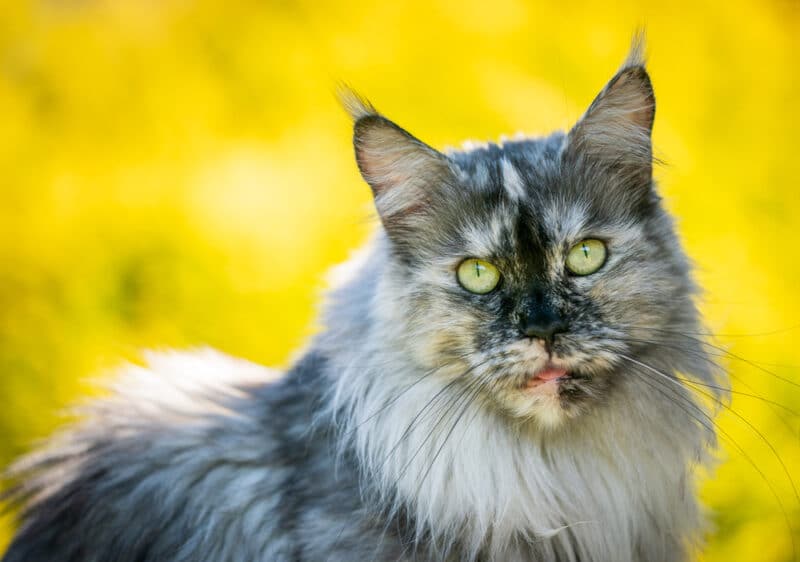The tortoiseshell is not a breed of cat but is a color point and marking. Several breeds have tortoiseshell patterns. It is lighter than a traditional tortoiseshell due to the blue coloring, and because the color is available as part of a range of breeds, a blue tortoiseshell cat can have any personality.
A blue tortoiseshell cat has the same markings as a tortoiseshell. They more accurately match the marking of a turtle than a tortoise, as tortoises tend to have shells with a single color. The pattern can contain any two colors and may include white as well.
The markings vary according to genetics and the breed of cat. Because it is a color mutation and not a specific breed, the blue tortoiseshell marking does not determine factors like personality or temperament in the cat.
The 8 Facts About Blue Tortoiseshell Cats
1. Genetic Mutation
The blue tortoiseshell pattern is a genetic mutation of the tortoiseshell coloring. All cat colors are a combination of just two color pigments: eumelanin and pheomelanin or black and red. However, cats can also carry other genes, like the dilute gene. This dilutes or lightens the black and red colors.
For a blue tortoiseshell, both the black and the red genes are diluted. Lightened black gives the cat a gray color, which is called blue. The diluted red appears cream.
Beyond that, the blue tortoiseshell can have any combination of blue and cream colorings, and they can appear in different shades, as well as with white hairs and white patches. Ultimately, a blue tortoiseshell cat gets their color from mutated pigments.
2. Most Torties Are Female
The X chromosome determines whether the cat will have black in their coat, while another X chromosome dictates the existence of red color pigments. A tortoiseshell, whether blue or standard, has both black and red in their coat, and they must have two X chromosomes, making them female.
If one of the chromosomes is a Y chromosome, which is required for the cat to be male, they will only have red or black in their coat.
3. Males Are Usually Sterile
Cats with two X chromosomes are female, and those with one X and one Y chromosome are male. In rare cases, a male cat can be born with two X’s and one Y chromosome. They have the two X chromosomes required to give the tortie coat and the XY chromosome mix that makes them male. However, this XXY combination leaves the cat with health issues. They usually have a shortened lifespan, and most male tortoiseshells are sterile.
4. Many Breeds Can Be Blue Tortoiseshell
Mixed breeds can be born with a tortoiseshell coat, while purebreds like the American and British Shorthair, the Persian, Cornish Rex, and Ragamuffin can also be born with this unique coloring.
5. Coat Length Can Vary
A tortoiseshell may have short or long hair. There are several mutations within a single gene that determine this. It is not related to the X or Y chromosome.
Generally speaking, a cat with hair that is 2 inches or longer is considered a long-haired cat. This isn’t always obvious in kittens, but if your kitten has tufts around their ears, it is usually a good indication that they will mature to be a long-haired cat.
6. They Can Have White Patches
Tortoiseshells can have some white in their coat. White is another mutation and represents a lack of pigmentation in the coat. Some cats are born without pigmentation in some areas, and some develop it as they age, typically because of a condition called vitiligo.
The white color cannot be muted, which means that it appears in both the tortoiseshell and the blue tortoiseshell coats. However, male blue torties usually experience health problems, rarely make it to adulthood, and are almost always sterile, but they are rare and not usually sold by breeders.
7. They Do Not Have Any Specific Health Conditions
A blue tortoiseshell cat’s weight, temperament, and lifespan can vary according to their breed. The color mutation that leads to the blue tortoiseshell markings does not impact the cat, so there are no illnesses or conditions that can arise as a result of the tortie markings.
8. They Are Rare
For a cat to be born a tortoiseshell, they must have two X chromosomes, and they must have the right combination of B and b genes to have black markings and O and o genes to have red markings. To be a blue tortoiseshell, the cat must also have diluted gene mutations.
Conclusion
Blue tortoiseshell cats are rare and almost always female. They are not a specific breed but have markings that can be present in any of several breeds of cats. They do not have any specific genetic conditions (unless they’re male), but some owners are convinced that tortoiseshells are especially sweet and loving cats.
Featured Image Credit: Shutterstock, Nils Jacobi












